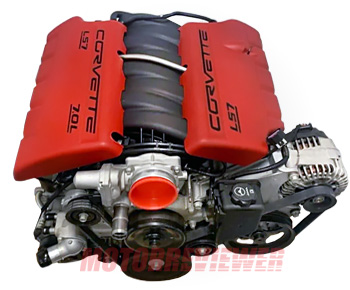GM 7.0L LS7 Engine Specs, Problems, Reliability, Info

Chevrolet 7.0L LS7 V8 Engine Info
The 7.0 V8 LS7 engine is a 7.0-liter gasoline naturally aspirated engine hand-built by General Motors Performance Build Center in Wixom, Michigan. The LS7 is a member of GM's Gen-IV Small Block family and is the largest engine in the LS series. This motor debuted in the 2006 Corvette Z06 and was available until 2015. After that, it was marketed as a crate engine for a while. Most of LS7s are installed in the Corvette Z06/427 Convertible and Camaro Z/28, but some are used for really exotic and rare race and sports cars such as the SIN R1 550, the Ultima GTR, the Ultima Evolution, and the Hennessey Venom F5. Let's explore the design of this 7.0-liter V8 engine, learn its features, reliability, durability, and some pros and cons.
GM 7.0L LS7 Engine Overview
The LS7 is based on the fourth-gen V8 architecture, with a 90-degree cylinder angle and 4.400-inch bore centers. The cylinder block is made of aluminum, and it uses pressed-in cast iron cylinder liners. The LS7's block came with a forged-steel crankshaft, doweled 6-bolt billet steel main caps, forged titanium connecting rods (only 464 grams), and flat-top cast M142 aluminum pistons. It also has piston oil squirters, which spray oil onto the underside of the pistons to cool them down and provide more lubrication. Corvettes with manual transmission utilize a dry sump oiling system.
Cylinder heads are also aluminum (GM part number 12578452). They feature two valves per cylinder, CNC-ported square intake ports, CNC-ported D-shaped exhaust ports, titanium, hollow stem intake valves and stainless steel exhaust valves with sodium filled stems. Intake valve diameter is 2.205 inches (56.0 mm), exhaust valve diameter — 1.610 inches (40.9 mm). The LS7 is still a pushrod engine with a single camshaft inside the cylinder block. This camshaft is driven by a small timing chain. It has the following specs: 210/230 duration (intake/exhaust), 0.593 in./0.589 in. valve lift (intake/exhaust), 120.5 degrees lobe separation. Good note that the LS7 did not come with Active Fuel Management (AFM) or Variable Valve Timing (VVT).
This engine uses a conventional sequential port-fuel injection system. LS7 injectors are rated at 41.74 lb/hr at 58 psi. The LS7's injection system is not Flex Fuel capable (premium fuel only). The stock intake manifold is made of plastic, and it features square ports specific to the LS7. This manifold is fitted with 90mm 4-bolt electronically-controlled throttle body (drive-by-wire or ETC). The engine also got an advance ignition system with a 58X crankshaft position encoder and individuals coils (coil-near-plug). On the exhaust sides, there are four-into-one stainless-steel hydroformed exhaust manifolds.
LS427 Crate Engine
In June 2020, GM introduced the LS427 crate engine based on the LS7. This 7.0-liter (427.8 cu in) motor was not used in any production vehicles. The LS427 comes with a conventional wet-sump oiling system, a unique hydraulic roller camshaft, fifth-gen Camaro Z/28 exhaust manifolds and a 14-inch MT flywheel. But the rest of the key LS7 components remain unchanged. This crate engine delivers 570 hp (425 kW) and 540 lb-ft (732 Nm) of torque. The production of the LS427 stopped in January 2022.
Engine Specs
10.0L (10.5 qt) - 2009+
Oil recommendations and capacity may vary depending on the car model, year, and market. Please check the service manual specific to your vehicle!
GM LS7 Engine Reliability and Problems
First of all, LS7 engines are hand-built in the GM Performance Build Center and treated much the same as the hand-built mills powering luxury cars. It is beyond question that every engine is carefully assembled with the utmost precision. At the same time, the reliability of the LS7 is highly debated. The block itself is very strong and durable, but the LS7 heads that come on it are known to have some issues that can lead to catastrophic failure. So let's take a look at the most common problems with the LS7 engine.
Valve Guide Wear
The most discussed issue on the Internet, rapid valve guide wear, affects a small number of 2009-2011 Corvette Z06 models. The root cause of the problem was a manufacturing error at the supplier of the cylinder head, which resulted in the valve guides being non-concentric with the valve seats. The most common owner's complaint has been excessive valve train noise. If this issue is not addressed, some valves could break and fall into the cylinder, causing a catastrophic engine failure.
Valve Drop Due to Over-Revving
The LS7 titanium intake valves are prone to fatigue cracking under high-stress conditions, especially in high-RPM operations. The issue relates to inconsistencies in the heat treatment process of the Ti-6Al-4V alloy, leading to slightly higher aluminum content in some batches of valves.
OEM Titanium Rod Failures
The main problem with LS7 titanium rods is that they do not like to rub against each other. Issues occur due to anti-friction coatings wearing out, allowing rod big ends to eat into each other, creating titanium dust. This debris will circulate throughout the oiling system, creating a "sandpaper" effect in the engine oil.
LS7 Longevity
Drawing the line, is the engine good or bad? The LS7 can be a very reliable engine if known issues are addressed (like a full valvetrain upgrade). Moreover, the longevity of this engine depends heavily on its maintenance and usage. A stock LS7 engine drops some valves around the 70-100k mark, but with proper care and upgraded valve guides (such as bronze guides), this high-performance 7.0-liter engine can achieve 200,000 miles or more.
